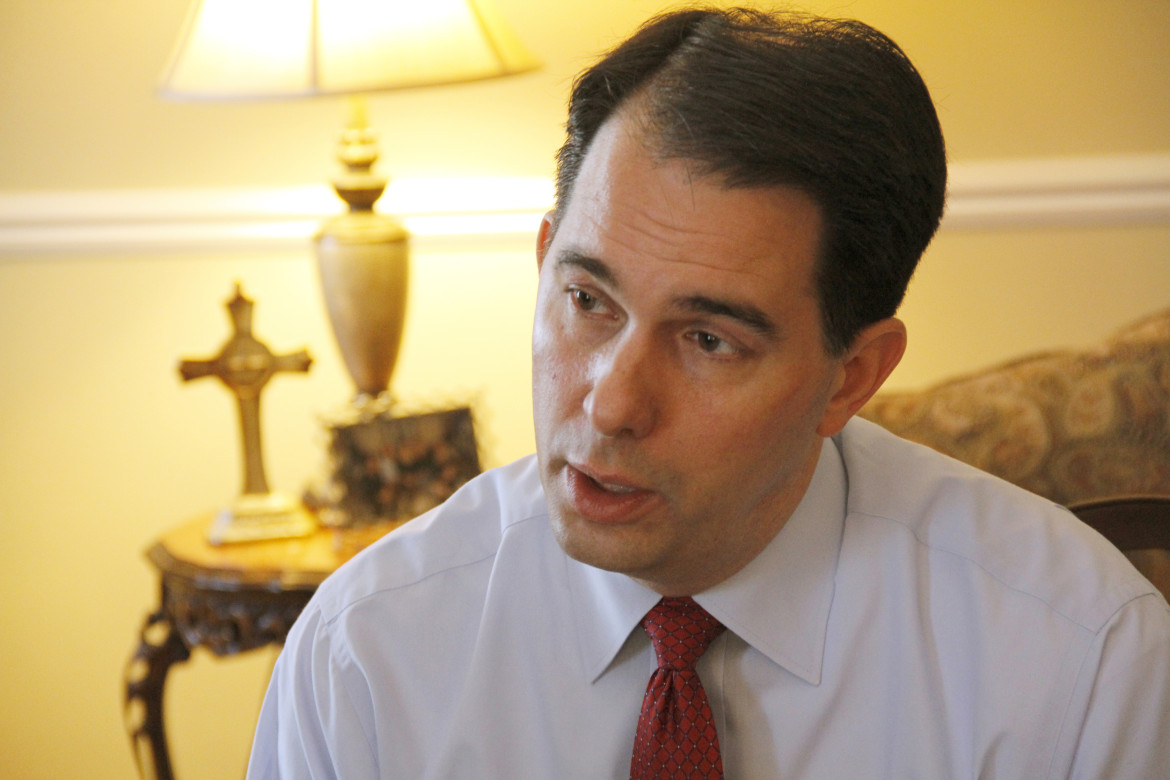Marquette Law School Poll finds Walker job approval at 37 percent, following presidential run
Trump takes GOP lead, Clinton holds Dem edge in Wisconsin

Gov. Scott Walker at the executive residence, Dec. 30, 2014. Photo by Kate Golden/Wisconsin Center for Investigative Journalism.
MILWAUKEE – A new Marquette Law School Poll finds Gov. Scott Walker’s job approval at 37 percent with 59 percent disapproval among Wisconsin voters following his presidential bid. In August, 39 percent approved and 57 percent disapproved.
Thirty-five percent say they would like to see Walker seek a third term as governor in 2018 while 62 percent would not. Support among Republican voters for a third-term bid is 79 percent.
With Walker out of the race, Donald Trump has moved into first place among Wisconsin Republican voters, with 20 percent support, followed by Ben Carson at 16 percent, Marco Rubio at 14 percent and Carly Fiorina at 11 percent. The remainder of the field includes Jeb Bush at 7 percent, Ted Cruz and Rand Paul each at 5 percent, Mike Huckabee, Chris Christie and John Kasich each at 3 percent, Rick Santorum at 1 percent and Bobby Jindal, George Pataki and Jim Gilmore at less than 1 percent. Lindsey Graham receives no support.
Trump shows a significant gain from August when he was supported by 9 percent, as do Fiorina and Rubio, who were both at 7 percent in August. Carson was at 13 percent a month ago.
Among Republicans and Republican leaners who said they would have voted for Walker had he stayed in the race, Trump receives 22 percent support, Rubio 14 percent, Carson 11 percent and Cruz 10 percent. Other candidates each received less than 10 percent from Walker supporters.
On the Democratic side, Hillary Clinton leads with 42 percent, followed by Bernie Sanders with 30 percent and Joe Biden at 17 percent. Martin O’Malley receives 1 percent with Lincoln Chafee and Jim Webb at less than 1 percent. In August, Clinton was at 44 percent, Sanders at 32 and Biden at 12 percent and the rest below 1 percent.
In the race for U.S. Senate, Democrat Russ Feingold is supported by 50 percent of registered voters while Republican incumbent Ron Johnson receives 36 percent support. In August, the race was tighter, with Feingold at 47 percent to Johnson’s 42 percent. In April, Feingold received 54 percent to Johnson’s 38 percent.
Marquette Law School Professor Charles Franklin, director of the poll, notes that the Senate candidates remain relatively unknown to voters: “Only 55 percent of registered voters are able to say if they have a favorable or unfavorable view of both candidates. Seven percent can rate Johnson but not Feingold while 18 percent can rate Feingold but not Johnson. And 19 percent are unable to rate either candidate. This is a recipe for volatility until the campaign moves into full swing.”
Feingold is rated favorably by 42 percent and unfavorably by 32 percent, with 26 percent unable to give a rating. In August, his rating was 42 percent favorable and 30 percent unfavorable, with 28 percent unable to rate. Johnson is rated favorably by 27 percent and unfavorably by 36 percent, with 37 percent unable to rate him. In August, his favorable rating was 30 percent, unfavorable was 31 percent, and 38 percent were unable to rate him.
The poll was conducted from September 24 to 28. The full sample includes 803 registered voters interviewed by cell phone and by landline, with a margin of error of +/-4.1 percentage points. Results for the Republican nomination are based on 321 registered voters who consider themselves Republicans or independents who lean to the Republican Party. The Democratic results are based on 394 Democrats or independents who lean Democratic. The margin of error for the Republican sample is +/-6.5 percentage points and for the Democratic sample it is +/-5.9 percentage points.
Looking ahead to possible general election preferences of Wisconsin voters, the poll found these results in head-to-head match-ups:
- Clinton 50 percent, Bush 38 percent.
- Clinton 48 percent, Rubio 40 percent.
- Clinton 50 percent, Trump 36 percent.
- Sanders 49 percent, Bush 39 percent.
- Sanders 49 percent, Rubio 36 percent.
- Sanders 53 percent, Trump 34 percent.
Walker support by party
Among Republicans, 79 percent would like Walker to run again for governor. Support for a third term is 65 percent among independents who lean Republican, while 15 percent of independents with no party leaning support a third-term bid. Support for a third term among independents who lean Democratic is 9 percent and among Democrats is 6 percent.
Asked if they would have supported Walker had he stayed in the Republican presidential race, 28 percent of Republicans and independents who lean Republican say they would, while 55 percent say they would have voted for some other Republican candidate. Ten percent say they would not have voted, five percent say they didn’t know and 2 percent say they would have voted in the Democratic primary. In August, Walker’s presidential bid was backed by 25 percent of GOP voters, down from 40 percent in April.
Among Republicans, 25 percent say they were pleased Walker ran and wish he had stayed in the race, while 40 percent say they were pleased but it was time to get out. Thirty percent say they wish he had not run. Support for the presidential bid is lower among independents who lean Republican, with 10 percent pleased and wishing he stayed in, 35 percent pleased but saying it was time to get out, and 51 percent saying they wish he had not run. Among independents with no party leaning, 67 percent wish he had not run, while 77 percent of Democratic leaners and 79 percent of Democrats wish Walker had not run for president.
Currently, 38 percent see Walker as very conservative, up from 31 percent in October 2014. Thirty-five percent see him as conservative, down from 42 percent in 2014. Seven percent see him as moderate, compared to 10 percent in 2014, and 10 percent see him as liberal or very liberal, the same as in 2014. Nine percent now say they don’t know where to place him ideologically, compared to 6 percent in 2014.
Economic conditions
Over the past year, perceptions of the economy’s direction have become somewhat less positive. Currently 24 percent say the economy has gotten better in the last year, 27 percent say it has worsened, and 47 percent say it has stayed about the same. In September 2014, 30 percent said the economy had improved over the year, 29 percent said it had worsened, and 41 percent said it had stayed about the same.
Looking ahead, 25 percent expect the economy to improve over the next 12 months, 20 percent expect it to worsen, and 50 percent think it will stay about the same. A year ago, 34 percent expected improvement, 17 percent expected worsening, and 44 percent expected little change.
Views of Pope Francis
Favorable views of Pope Francis have increased. His favorable ratings have risen to 66 percent, from 51 percent in August, with 12 percent holding unfavorable views of him in both months. Those unable to give a rating fall to 21 percent from 36 percent in August. Favorable ratings have increased 5 points among Catholics, to 75 percent from 70 percent. Among Protestants, the increase is 21 points, to 59 from 38 percent. Those who say they have no religious affiliation report a 16 percent increase in favorability, to 71 percent from 55 percent.
Second choices
Combining first and second choices is an alternative measure of a candidate’s strength. The table below provides the first, second, and combined support of all Republican candidates among Republicans and independents who lean Republican. The table is ordered by combined support and then by name. By this measure, Rubio ranks first, followed by Carson, Fiorina and Trump.
| Candidate | First Choice | Second Choice | Combined |
| Rubio | 14 | 17 | 31 |
| Carson | 16 | 12 | 28 |
| Fiorina | 11 | 15 | 26 |
| Trump | 20 | 5 | 25 |
| Bush | 7 | 10 | 17 |
| Cruz | 5 | 8 | 13 |
| Christie | 3 | 7 | 10 |
| Huckabee | 3 | 6 | 9 |
| Paul | 5 | 4 | 9 |
| Kasich | 3 | 1 | 4 |
| Jindal | 1 | 2 | 3 |
| Santorum | 1 | 2 | 3 |
| Graham | 0 | 2 | 2 |
| Pataki | 0 | 1 | 1 |
| Gilmore | 0 | 0 | 0 |
Among the Democrats, Clinton ranks first in combined support, and Biden moves to second place, with Sanders in third.
| Candidate | First Choice | Second Choice | Combined |
| Clinton | 42 | 27 | 69 |
| Biden | 17 | 38 | 55 |
| Sanders | 30 | 21 | 51 |
| O’Malley | 1 | 3 | 4 |
| Chafee | 0 | 3 | 3 |
| Webb | 0 | 2 | 2 |
Opinions of other political figures
Approval of how President Barack Obama is handling his job stands at 51 percent, with 45 percent disapproving. In August, 48 percent approved and 48 percent disapproved.
Lt. Gov. Rebecca Kleefisch is rated favorably by 21 percent of registered voters and unfavorably by 29 percent, with 49 percent unable to give a rating. In October 2014, she received a 29 percent favorable and 25 percent unfavorable rating, with 45 percent unable to give a rating.
About the Marquette Law School Poll
The Marquette Law School Poll is the most extensive statewide polling project in Wisconsin history. This poll interviewed 803 registered Wisconsin voters, by both landline and cell phone, from September 24-28, 2015. The margin of error is +/- 4.1 percentage points for the full sample. For Republicans and independents who lean toward the Republican Party, the sample size is 321, with a margin of error of +/- 6.5 percentage points. For Democrats and independents who lean toward the Democratic Party, the sample size is 394, with a margin of error of +/-5.9 percentage points. Republican and Democratic presidential primary items were asked of the corresponding party samples.
The partisan makeup of this sample, including those who lean to a party, is 40 percent Republican, 49 percent Democratic and 9 percent independent. The long-term estimate over the previous 29 statewide Marquette polls, with 25,121 respondents, is 43 percent Republican and 47 percent Democratic, with 9 percent independent. The partisan makeup excluding those who lean to a party is 25 percent Republican, 30 percent Democratic and 41 percent independent, compared to the long-term estimate of 27 percent Republican, 31 percent Democratic and 38 percent independent. The entire questionnaire, full results, and breakdowns by demographic groups are available at http://law.marquette.edu/poll.
NOTE: This press release was submitted to Urban Milwaukee and was not written by an Urban Milwaukee writer. While it is believed to be reliable, Urban Milwaukee does not guarantee its accuracy or completeness.
Mentioned in This Press Release
Recent Press Releases by Marquette University
New Marquette Law School Poll finds large majority of Wisconsin voters not yet tuned in to who is running in major 2026 elections
Oct 29th, 2025 by Marquette UniversityNo candidate has established strong position in public favorability in governor, state Supreme Court races; large majorities of voters undecided
New Marquette Law School National Survey Finds Large Majority Think Political Violence is a Big Problem, But With Sharp Partisan Differences
Oct 1st, 2025 by Marquette UniversityAmericans are overall pessimistic on reducing intense political conflict; half of those polled say heated language by leaders makes violence more likely





















